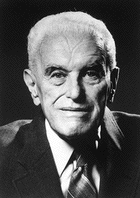| Profile | Major Works | Resources |
John C. Harsanyi, 1920-2000

Hungarian-American game theorist and utilitarian philosopher at Berkeley.
John C. Harsanyi was born in Budapest, the son of Jewish pharmacists. He studied pharmacology at the University of Budapest. He evaded much of war, but in 1944 Harsanyi was arrested by Nazi authorities and deported to a concentration camp. Harsanyi managed to escape, and was hidden in the basement a Jesuit chapter house.
After the war, Harsanyi completed his doctorate in philosophy and sociology at Budapest in 1946, but departed Hungary in 1948 after the ascent of the communist regime. Harsanyi moved first to Australia, and enrolled at the University of Sydney to study economics, receiving his M.A. in 1953, from which emerged his first works on uncertainty and utilitarianism. In 1956, Harsanyi went to the United States on a Rockefeller fellowship, receiving his Ph.D from Stanford under Kenneth J. Arrow in 1959, with a thesis on game theory. After a brief stints at Australian National University and Wayne State University in Detroit, Harsanyi joined the faculty at UC Berkeley in 1964.
In utilitarian philosophy, Harsanyi's 1953 article derives social preferences from individual preferences using the argument of rational decision making under uncertainty with von Neumann-Morgenstern expected utility. Harsanyi anticipates John Rawls's "veil of ignorance" argument - specifically, Harsanyi identified "social preferences" as the preferences an individual would have if he thought there was an equal chance of being anyone in society. He followed this up in 1955, and a series of other articles. Harsanyi concludes that the social welfare criteria should be maximizing the average utility of society, rather than Bentham's total utility or Rawls's minimum utility. His 1977 article puts Harsanyi as one of the more prominent advocates of a "rule utilitarianism" (as opposed to "act utilitarianism") conception of utilitarian ethics.
Harsanyi's 1967 papers introduced the concept of Bayesian games (games under uncertainty) in game theory.
Harsanyi shared the Nobel memorial prize in 1994 with John Nash and Reinhard Selten.
|
Major Works of John C. Harsanyi
|
|
HET
|
|
Resources on J.C.Harsanyi
|
All rights reserved, Gonçalo L. Fonseca
